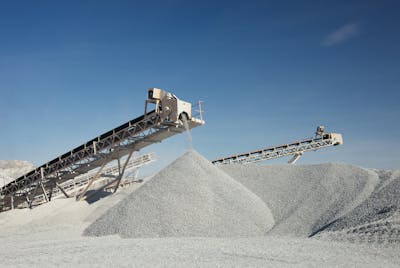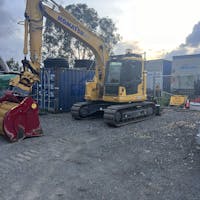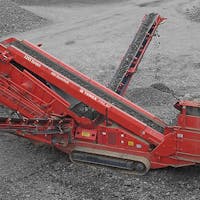Mobile Screening Plant Hire
- Post a job
- Receive multiple quotes
- Choose your preferred Mobile Screening Plant Suppliers
Where do you need Mobile Screening Plant Hire?
Describe your job and our suppliers will send you quotes
89 Mobile Screens for Hire on iseekplant
At iseekplant, we connect you with a full range of mobile screening plant equipment hire options from 89 suppliers across Australia, with many located in Western Australia, a hub for mining and quarrying operations. Our network offers the right equipment and flexibility for long or short term hire for your job site. In this guide, we cover the benefits of mobile screening plants, hire rates, equipment types, comparisons with stationary plants, and key regulations to help you make the right choice for your project.
Mobile Screening Plant Hire Rates Guide
This table outlines the average rates, offering insight into both wet and dry hire options:
| Plant Size | Dry Hire Rate (per day) | Wet Hire Rate (per day) |
|---|---|---|
| Small | $250 - $400 | $450 - $600 |
| Medium | $400 - $550 | $600 - $750 |
| Large | $600 - $800 | $800 - $1,000 |
Note: Rates vary depending on the machine's age, brand and location within Australia. All listed prices are estimates, exclude GST and are in AUD.
It’s rare to dry hire a screening plant unless you can demonstrate operator training, maintain safety standards, and the ability to maintain and troubleshoot the equipment. Hiring companies are often liable for safe operation, requiring extensive waivers or proof of competency.
Since the screen typically operates in a circuit with a crushing plant and conveyor belt, suppliers may insist on proper installation to ensure compatibility with related equipment, such as triple deck screens or mobile crushing setups. This approach minimises downtime costs and maximises cost effectiveness, ensuring seamless integration for crushing screening applications.
Additional Costs to Consider When Hiring Mobile Screening Plant
When planning your hire, consider these additional costs to ensure a comprehensive budget:
| Additional Cost | Updated Rate | Description |
|---|---|---|
| Transportation | $150 - $400 | Cost of delivering and picking up the plant |
| Operator Training | $200 - $300 | Necessary for teams unfamiliar with the plant |
| Maintenance | 5% - 10% of hire cost | Regular upkeep during the hire period |
| Fuel | Market Rate | Fuel costs, if not included in the hire rate |
| Breakdown Contingency | $500 - $2,000 | Costs for unforeseen repairs or breakdowns |
These costs are just estimates and will change per supplier. Use our Get a Quote tool to connect with our network for a detailed estimate, including all potential costs for your specific project needs.
Different Types and Capacities of Mobile Screening Equipment
Mobile screening plants are essential for sorting and processing various materials, designed to separate materials efficiently across a range of operational needs. They come in diverse types and capacities to suit different projects. This quick comparison table highlights popular models, capacities, ideal applications, and the pros and cons of various screening equipment:
| Equipment Type | Popular Models | Capacity (tonnes per hour) | Ideal Applications | Pros | Cons |
|---|---|---|---|---|---|
| Trommel Screens | Vermeer TR5300 | Up to 300 tph | Screening soil, compost, wood chips, etc. | High throughput | Limited to cylindrical separation |
| Vibratory Screens | Metso Lokotrack ST2.8 | Up to 450 tph | Sorting sand, gravel, and other fine materials | Precise sorting | Less effective with moist materials |
| Inclined Screens | Powerscreen Chieftain | Up to 400 tph | Handling larger, heavier materials | Good for heavy materials | Requires more space |
| Horizontal Screens | Terex Finlay 984 | Up to 500 tph | Sorting both wet and dry materials | Efficient, versatile | Higher energy consumption |
| Scalping Screens | Sandvik QE141 | Up to 300 tph | Heavy-duty applications like quarry work | Robust, durable | Not for fine materials |
Other Essential Equipment
Apart from the main screening units, several other machines and services complement mobile screening operations. These equipment enhance efficiency, safety, and overall functionality:
| Equipment | Quick Specs | Applications |
|---|---|---|
| Excavators | Various sizes and capacities | Feeding material into screeners |
| Wheel Loaders | Load capacities of 1-5 tons | Material handling and loading |
| Conveyors | Lengths and widths vary | Transporting sorted materials |
| Crushers | Range in size and type | Used before/after screening |
| Dust Suppression Units | Vary in capacity and range | Improving air quality at site |
Connect with Leading Mobile Screening Plant Suppliers Now
Finding the right mobile screening plant doesn’t have to be complicated. With iseekplant, you can quickly access Australia’s largest database of mobile screening plant hire options, including those available on a dry hire basis. For personalised support or inquiries, contact us at projects@iseekplant.com.au or call 1300 691 912 with your project requirements. Ready to find the right service? Click 'Get a Quote' and streamline your screening process today!
Popular Mobile Screening Plant Hire Locations
Become a supplier
Recent Mobile Screening Plant Hire reviews
How It Works
Mobile Screening Plant Hire FAQs
Here are some frequently asked questions and tips on finding the right mobile screening plant supplier for your job.
What do we have to offer?
Want to Know More?

Top 3 Best Crushing and Screening Equipment Brands
What are the best crushing and screening equipment brands in Australia? ...



